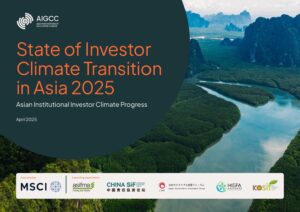Singapore’s institutional investors are ahead of overall investors in Asia (including some large global investors active in the region) across several key climate management metrics, including setting climate policies and risk assessments.
The full dataset covers 230 of the most significant and influential investors across Asia. The Singapore investor sample includes 18 institutional investors headquartered in Singapore with SGD$3.73 trillion (US$2.8 trillion in collective AUM) with a median AUM of SGD$116 billion (US$87 billion).

Download the Report
The research finds Singapore-based investors are significantly ahead of their regional peers in:
- Recognition of Climate Risks and Opportunities. This is becoming mainstream investment practice amongst Singapore-based investors.
(89% of Singapore investors vs Overall Asia Investor Average of 75%).
- Conducting Advanced Climate Scenario Analysis where Singapore-based investors scored an average of 72% (vs Overall Asia Investor Average of 44%).
- Policies on Fossil Fuels or High-Emitting Sectors. 61% of Singapore-based investors have policies which indirectly or directly support the transition to renewable energy and the electrification of industries (vs Overall Asia Investor Average of 43%).
For a sophisticated financial sector in a developed economy like Singapore, Singapore-headquartered investors are still tracking at average levels for aligning investments towards climate change:
- Climate Solutions Investments
Singapore Investor Average of 34% vs Overall Asia Investor Average of 34%
- Asset-Level Targets that show alignment of different asset classes to global climate goals, for example in accordance with the Net Zero Investment Framework 2.0, are still nascent.
Singapore Investor Average of 28% vs Overall Asia Investor Average of 25%
Accelerated progress in climate solutions and transition finance will transform Singapore’s economy to a low-carbon, climate resilient one.
Moreover, Singapore-based investors are lagging the market on some climate metrics, including areas of governance, policy advocacy, and climate-related disclosures, for example:
- Linking Board Renumeration to Climate Performance:
Singapore Investor Average of 28% vs Overall Asia Investor Average of 35%
- Publication of Investor Climate Transition Plans:
Singapore Investor Average of 28% vs Overall Asia Investor Average of 35%
- Biodiversity or Nature Disclosures/Strategy:
Singapore Investor Average of 17% vs Overall Asia Investor Average of 33%
- Disclosure of Physical Risks/Adaptation Actions:
Singapore Investor Average of 30% vs Overall Asia Investor Average of 43%
- Advocacy for Climate Policy/Regulation:
Singapore Investor Average of 22% vs Overall Asia Investor Average of 25%
The data is an exclusive Singapore extract that complements the sixth edition of the Asia Investor Group on Climate Change (AIGCC)’s annual flagship report, ‘The State of Investor Climate Transition in Asia’.
AIGCC CEO, Rebecca Mikula-Wright, said:
“We see investors progressing well on climate this year, defying global headlines of climate backtracking. There is of course, much more that needs to be done to accelerate action from all investors in the region. Singapore’s vulnerability to climate change means there’s a lot at stake for investors. AIGCC data reveals that Singapore-based investors recognise the significant financial implications of climate risks and opportunities that they must properly manage, despite the politicisation of climate in the US market.
“Singapore-based investors who know how to manage these risks and opportunities will lead the market in bringing long-term financial returns to their beneficiaries and accelerate the transition to a low-carbon economy. At the same time, investors can play their part and contribute to Singapore’s Green Plan 2030 and national climate goals.
“In fact, AIGCC members, including Singapore members, are outperforming the market across the board, demonstrating advantages of joining an investor network committed to accelerate climate action.”
Eastspring Investments CIO, Vis Nayar, said:
“As a global investor with deep local market expertise in Asia and emerging markets, we have witnessed first-hand how climate impacts the environment and companies we are investing in. Despite the changing policy landscape, we believe that taking account of these issues is not just about mitigating risks, but also about actively seeking out investment opportunities aligned with a climate impacted future. For example, policy changes and return opportunities have led us to develop a holistic brown and green “improvers” strategy. This strategy addresses climate adaptation, policy uncertainty and transition opportunities in a net zero and climate changed world. These strategies can be made available to global and regional investors.”
AIGCC will present more insights in an in-depth investor briefing that will be held in Singapore on 3 April 2025, focussing on data from AIGCC’s flagship report, State of Investor Climate Transition in Asia and the performance of Singapore-headquartered investors. This will be followed by a panel discussion, moderated by Monica Bae, Director of Investor Practice, AIGCC, featuring the following panellists:
- De Rui Wong, Senior Vice President, GIC;
- Pooja Daftary, ESG Analyst, MFS Investment Management;
- Joanne Khew, Director, ESG Specialist, Eastspring Investments; and
- Anthony Chan, Vice President at MSCI APAC ESG & Climate Research.
AIGCC thanks MSCI for their sponsorship of the report and event as well as Eastspring Investments for hosting the event.
AIGCC’s ‘The State of Investor Climate Transition in Asia’ report is the most comprehensive and reliable snapshot of how investment decision-makers in the region’s capital markets are managing climate and nature; perhaps the biggest factors influencing the region’s long-term economic development.